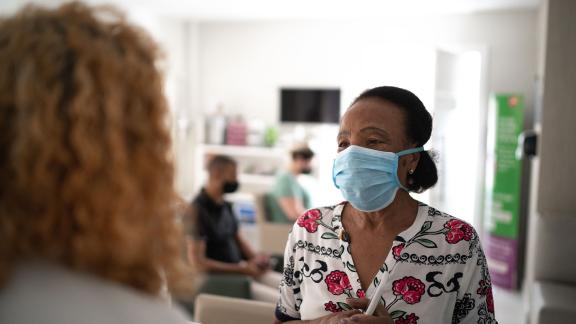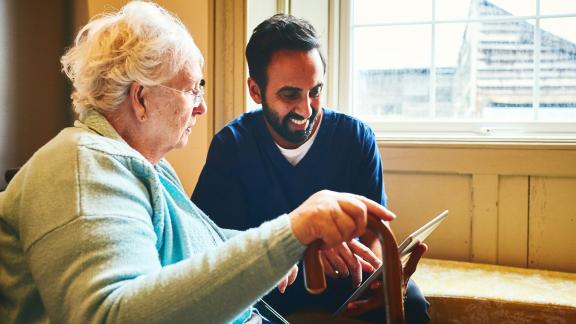Primary care: making a difference

Emma Ray, primary care network (PCN) manager at Canterbury North and South PCNs, writes an uplifting account of how her PCN’s COVID-19 vaccination service gave her the chance to reconnect with what motivates her to want to make a difference.
I have worked in primary care management for over 16 years and, like most in a similar role, spend the vast majority of my working hours in an office or a meeting room. I talk with colleagues, formally and informally, I read and write reports or guidance documents, and like many of us, I am a slave to Outlook the Omnipotent. Don’t get me wrong, I get inherent satisfaction from seeing my email inbox reduce in size and truly appreciate the aesthetic of a beautifully formatted report or colour-coded spreadsheet. However, it is not always easy to see the connection between what I do day in, day out and what motivates me as an NHS manager.
I want to make a difference; don’t we all? I want to make a difference certainly to the working lives of colleagues, but ultimately, what drives me is that I want to make a difference to people and communities. I want to make sure we have systems, processes and infrastructures in place to enable great care that makes a difference to people day in, day out. I firmly believe there is a mutual co-dependency between administrative and clinical colleagues – neither can do what they do without the other.
In my usual day to day, I don’t have much direct interaction with our patients. Of course, I review and discuss patient feedback and read through patient group meeting notes but rarely come face to face with a real live patient.
One day last December that changed.
Following months marked by fear, isolation, private tragedies and increasing despair, PCNs, working collaboratively, were given a fantastic opportunity to make an incredible difference. COVID-19 vaccines had been approved and we were going to be at the forefront of bringing hope to some of the most vulnerable people in our communities.
On a cold dark afternoon in December, after many, many long hours and late nights working with clinical and administrative colleagues from across our PCN, doing the usual things a manager does, planning, meeting, liaising, document-writing and reading endless guidance, we were ready, we had a safe, efficient, caring COVID-19 vaccination service.
Our vaccination service
As I stood at the door, checking people in and chatting to those waiting to be vaccinated and those waiting afterwards, I felt immensely proud of the service we had put together at pace and of the way multidisciplinary teams were all pulling together, all of them going the extra mile.
We welcomed people who had spent most of the previous months very isolated - one woman hadn’t seen anyone apart from delivery drivers since March. At different times in the day, it was lovely to see acquaintances and friends who hadn’t seen each other for months, having a socially distanced chat. Most were anxious but, overwhelmingly, they were so grateful for the hope and the future the vaccination was giving them. There were moments that stood out like the centenarians, married for over 70 years, who arrived in wheelchair formation - side by side, and the barely mobile man who turned up with his dog at the wrong time on the wrong day, who was so caringly reassured by the marshal that she would look after his dog and of course we could fit him in.
These weren’t a cohort or a population, these were all people. The people who are at the heart of the PCN ethos: integrated care around the person. It’s what got us excited and motivated about PCNs when they came along. Being able to work with our local communities and really make a difference to the lives of people is what floated our boat.
Our service wasn’t unique and I’m sure many of us have similar stories, but what was unique was that every one of us, whether clinical or administrative, went home that night knowing we really had made a difference. For me, the personal epiphany was that I was able to directly connect what I do day in, day out with a difference being made and it refreshed my motivation as an NHS manager and renewed my determination to push for PCNs to have a strong voice in the large system in which they operate. PCNs are close to their communities and they must be empowered to make a difference to the people in those communities. Local initiatives need to be allowed to thrive, not just ICS- level population health imperatives.
As a member of the NHS Confederation PCN board I am really looking forward to building on the connections I have made through the managers’ network and am enthused to be joining a board that is made up of a range of the co-dependent professionals involved in PCN leadership. I am looking forward to engaging in discussions about the emerging new NHS system and pushing for ‘power to the PCNs,’ but all the time keeping in mind the man with his dog, or the woman who hadn’t seen anyone for nine months: the people for whom we must strive to make a difference.



